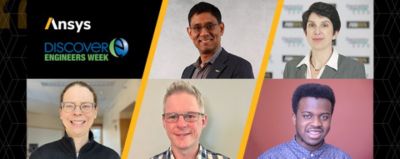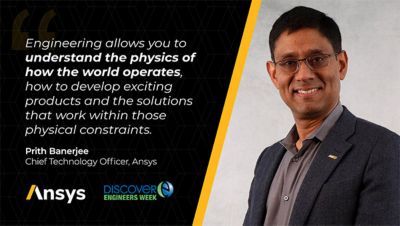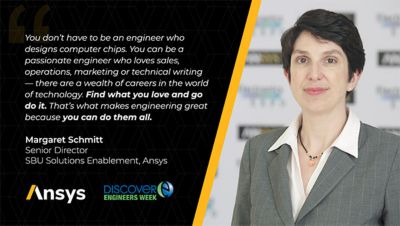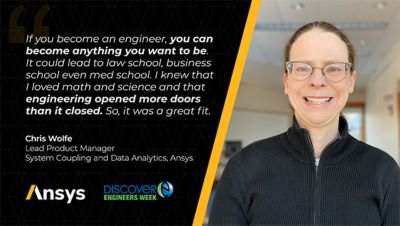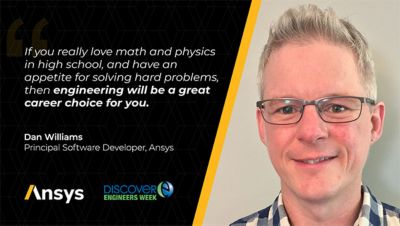-
United States -
United Kingdom -
India -
France -
Deutschland -
Italia -
日本 -
대한민국 -
中国 -
台灣
-
Ansys는 학생들에게 시뮬레이션 엔지니어링 소프트웨어를 무료로 제공함으로써 오늘날의 학생들의 성장을 지속적으로 지원하고 있습니다.
-
Ansys는 학생들에게 시뮬레이션 엔지니어링 소프트웨어를 무료로 제공함으로써 오늘날의 학생들의 성장을 지속적으로 지원하고 있습니다.
-
Ansys는 학생들에게 시뮬레이션 엔지니어링 소프트웨어를 무료로 제공함으로써 오늘날의 학생들의 성장을 지속적으로 지원하고 있습니다.
ANSYS BLOG
February 17, 2020
Celebrate National Engineers Week with 5 Vibrant Role Models
The world needs more engineers to drive the advancements and solve the challenges faced by society. That is why it’s customary to introduce people to the profession during Engineers Week.
By sharing why engineers are passionate about the profession we hope to convince others to join in our passions.
Ansys employees share their engineering stories.
Already convinced? Learn how to start an engineering career at Ansys.
For everyone else, here are five Ansys employees that might inspire you to become an engineer.
The Chief Technology Officer Delivering Simulation Technology to Innovators
A common question people ask during Engineers Week is: “Why do engineers love the profession?”
Prith Banerjee, CTO at Ansys
For Prith Banerjee, chief technology officer (CTO) at Ansys, it’s because “engineering allows you to understand the physics of how the world operates, how to develop exciting products and the solutions that work within those physical constraints.”
Banerjee’s engineering inspiration matches well with his current position. Like many engineers, he idolized Thomas Edison and his skills as an inventor. This is quite fitting as Ansys’ pervasive engineering software, which Banerjee helps to develop, is used by inventors and innovators from around the world.
Edison’s view on iteration — highlighted by his quote about discovering 10,000 ways not to develop a light bulb — also informs how Banerjee talks to those looking to join the engineering community. Banerjee said, “Focus on learning how to learn because your career will be a period of constant adaption and learning.”
The Silicon Valley Innovator Inspired by Great Women of History
Margaret Schmitt is a senior director at Ansys. At an early age, her engineering inspiration was the space program and its technological advancements.
Margaret Schmitt, senior director at Ansys
“I originally dreamed of being a pilot and astronaut so I could push the boundaries of engineering,” she said. “I was also inspired by the women that came before me: Rosalind Franklin, who discovered the structure of DNA; Katherine Johnson, the NASA mathematician who inspired the book and movie “Hidden Figures”; and Marie Curie, who won two Nobel Prizes for her work on radioactivity and radium. I’m inspired by women who pushed through boundaries, followed their stars and didn’t let prejudices stop them.”
Schmitt started her career working for a network computing giant in Silicon Valley. The technology the company was creating really clicked with her passions.
“Once I opened books on semiconductors and electromagnetics, it drew me in like nothing else did,” said Schmitt. “Thanks to the global networking technology made possible by those pioneering companies my husband and I worked with, people are doing surgeries from across the world. I’m very proud when I go back to the Valley and say, ‘Hey, I helped build this!’”
This passion for electromagnetics shapes Schmitt’s advice to future engineers. She said, “Follow your heart and passion. You must love it. You don’t have to be an engineer who designs computer chips. You can be a passionate engineer who loves sales, operations, marketing or technical writing — there are a wealth of careers in the world of technology. Find what you love and go do it. That’s what makes engineering great because you can do them all.”
As for young women thinking of joining the profession, Schmitt understands the hurdles that can appear. To overcome them, she suggests “having confidence in what you do. While you may be questioning yourself, remember that others are questioning themselves. You are good enough! Raise your hand for that assignment, run the team and do the job! That’s easy to say and hard to do — I know. But everyone doubts themselves so have confidence. You can change the world.”
The Math and Science Wiz Without an Early Career Path
Chris Wolfe, lead product manager at Ansys agrees with Schmitt’s views on how engineering opens many potential career paths. In fact, it’s one of the major reasons Wolfe pursued the profession.
Chris Wolfe, lead product manager at Ansys
She said, “In tenth grade I had no clue what I wanted to be. Then, my teacher had a talk about engineering. During the talk, it was said that if you become an engineer, you can become anything you want to be. It could lead to law school, business school even med school. I knew that I loved math and science and that engineering opened more doors than it closed. So, it was a great fit.”
Wolfe’s studies grew into a love for technology. She was always interested in how things were made and was now learning how things worked. Since the profession was detail oriented, it matched well with her skill sets.
“Thankfully, no one told me that I couldn’t do this job because I’m a woman,” she said. “But, if they did, I’d tell them that I could! I always had the highest grades in math and science. So, I adapted to the profession very well.”
For those that might not know what they want to be when they grow up, Wolfe gives the same advice she was given: “Pursue engineering as you can typically do business with an engineering background but it’s much harder to do engineering from a business background. The career is versatile, you can do a lot with it.”
As for young women getting into the profession, she encourages them to build a strong network of other female engineers. “Many female engineers’ transition into a new career because of the environment — not their ability,” she said. “However, when women in the profession get together, they can empathize about the issues they face and gain advice from their peers.”
The Aerospace Fan Unsure About University
Wolfe wasn’t the only person influenced by a teacher to become an engineer. The same could be said about Dan Williams, principal software developer at Ansys. In fact, when Williams was a teenager, he didn’t think about university — let alone engineering.
Dan Williams, principal software developer at Ansys
“I had planned to enter a popular aeronautical program at a local technical college. I was really interested in aircraft growing up,” he said. “My parents related this plan to my drafting teacher, and he reacted strongly. As I was doing well academically, he suggested that I consider going to a university and enrolling in an engineering program.”
Williams was convinced about attending a university but was still unsure about engineering, so he entered a computer science program. But it turned out that his teacher was right. Williams found his studies too abstract and transferred to engineering the following year. He never looked back.
“The most amazing part about being an engineer is the breadth of problems that I’ve gotten to work on over my career,” he said. “During university I enjoyed solving math, physics and design problems. Later, in graduate school and the workforce, I resurrected my computer science skills to help solve a variety of engineering fluid dynamics problems by implementing computational fluid dynamics (CFD) simulation software.”
Williams found it fascinating to apply math and science directly to fluid problems by creating software that was useful to others. In fact, it’s that love for solving problems that led to his recommendations to future engineers.
“If you really love math and physics in high school, and have an appetite for solving hard problems, then engineering will be a great career choice for you,” he said. “Becoming an engineer is a lot of hard work and as you go through it the end result will not seem clear. However, the great thing about getting through it is that once you have a degree, there are few boundaries. You can take the problem-solving skills you learn and apply them to almost anything you can imagine.”
The Community Builder Hoping to Change the World
Friends and family also influenced Tolu Wright, technical documentation specialist co-op at Ansys. As a child in Nigeria, Wright was exposed to many successful people and it took him some time to determine a career path.
Tolu Wright, technical documentation specialist co-op at Ansys
He said, “It wasn’t until I was 15 years old that I had my first taste of engineering. I was fortunate to have a family friend who was able to help me get an internship with a prominent oil and gas company. I learned how different departments and units worked together on a system to achieve a common goal. I also saw how my family friend was influential in an organization that was helping to develop Africa. This was a cue for me to become an engineer.”
Wright learned that he wanted to take a career path that would help him make substantial contributions to nations and communities that needed it. Engineering — aligned with his personal interests — would give him the abilities to achieve his goals of helping others.
“Being from Africa, I have a unique perspective,” said Wright. “We need to harness the vast resources of the region as well as enhance its socioeconomic development. With the kinds of technologies present in other parts of the world, the sky is the limit to what can be achieved in these regions from an engineering perspective. We can help develop products and services that are best suited for each individual community and around the world.”
According to Wright, engineering is a great profession for those who have an interest in pursuing skills that can bring out the best of your abilities. He notes that it isn’t an easy subject to study, but it will make you resilient, satisfied and proud.
“I like engineering because with the pace at which things are being discovered, we now have the potential to significantly better the lives of millions of people who struggle around the world. I believe we have a duty to do that,” said Wright. “We are in a period when the need for engineers is at an all-time high. If you believe in making the world a better place and giving tremendous hope to future generations, then a career in engineering might be the best option for you.”
Are you now convinced to pursue engineering? If so, visit the Ansys career page.











